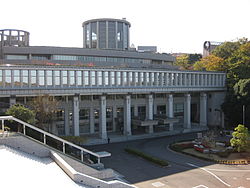Senshu University
Private university in Chiyoda, Tokyo, Japan From Wikipedia, the free encyclopedia
Private university in Chiyoda, Tokyo, Japan From Wikipedia, the free encyclopedia
Senshu University (専修大学, Senshū Daigaku), generally referred to as Senshu (専修) or Sen-Dai (専大), is a private university located in Chiyoda, Tokyo, Japan. Founded in 1880[1] as Senshu College (専修学校, Senshu Gakko), which was recognised as one of the Five Great Law Schools by four co-founders, it is one of the oldest universities in Japan.
専修大学 | |
 Senshu University Ikuta Campus | |
| Motto | 報恩奉仕 (Gratitude and service) |
|---|---|
| Type | Private |
| Established | 1880 |
| President | Yoshihiro Hidaka |
Academic staff | 1,139 |
| Undergraduates | 20,176 |
| Postgraduates | 484 |
| Location | , Japan |
| Campus | Urban |
| Colors | |
| Mascot | Sendy (センディ) |
| Website | www |
 | |
The university has a total of about 20,000 students coming from the Greater Tokyo Area. Senshu is organised into seven undergraduates, five graduates, and one professional graduate school; and twelve research institutes. The university currently has partnerships with 35 universities and institutions in 19 countries. Some of the University's partners include: the University of Bristol (England), the University of Barcelona (Spain), Peking University (China), and the University of Oregon (United States).[2]
Since its founding, Senshu University has sent out about 290,000 graduates, with alumni in diverse fields such as politics, business, culture, entertainment, sports, and mass media. Senshu University alumni include the former Minister of Defence, eleven sitting Diet members, 195 professional athletes, and twenty four company chief executives. As of 2023, 70 Senshu alumni have participated in the Olympic Games and 9 alumni have won medals.[3]


The university was founded in September 1880, as Senshu College by four co-founders: Nagatane Soma, Tanetaro Megata, Inajjiro Taziri and Shigetada Komai.[4]
In the late 19th century, the Meiji government encouraged students to study abroad to gain advanced Western knowledge. With the institution, they all have studied at universities in the United States such as Columbia University (Soma), Harvard University (Megata), Yale University (Soma, Taziri) and Rutgers University (Komai).[5] In 1875, they founded the Japan Law Company in the United States and envisioned the establishment of a new educational institute. In 1879, they received support from Yukichi Fukuzawa and they established the Night Law School in Fukuzawa's Keio-Gijuku. In 1880, the Night Law School became independent of Keio-Gijuku and merged with two private schools to form Senshu College, which was established as an Anglo-American law school and economics school. At that time, there were only a few schools that could teach specialised law, and the University of Tokyo taught law in English and the Ministry of Justice Law School taught law in French. Meanwhile, Senshu was the first college where Japanese teachers taught specialised subjects in the Japanese language, and it was also the first college to establish a school of economics in Japan.[6]

After 1885, Senshu was moved its campus from Ginza to Kanda, and built the Black Gate (黒門 Kuromon), which was reconstructed in 2010 as the Kanda Campus Monument. In 1888, Senshu was recognised as one of the Five Great Law Schools.[7] In 1918, the government enacted the University Establishment Ordinance and eight universities, which including Keio University and Waseda University were approved as a universities in 1920, and Senshu was also approved as a university in 1922. The Kanda campus is located in Kanda-Jinbōchō and formed a college town with Hosei University, Chuo University, Nihon University and Meiji University. After the World War II, Senshu established the Ikuta campus in Kanagawa Prefecture to cope with the increasing number of students. Today, Senshu has grown into a comprehensive university with 7 undergraduates, 5 graduates, 1 professional graduate school. In 2010, Senshu declared ‘Development of Social Intelligence’ as its vision for the 21st century.

The university is affiliated with the following schools and universities in Japan.[12]
Seamless Wikipedia browsing. On steroids.
Every time you click a link to Wikipedia, Wiktionary or Wikiquote in your browser's search results, it will show the modern Wikiwand interface.
Wikiwand extension is a five stars, simple, with minimum permission required to keep your browsing private, safe and transparent.